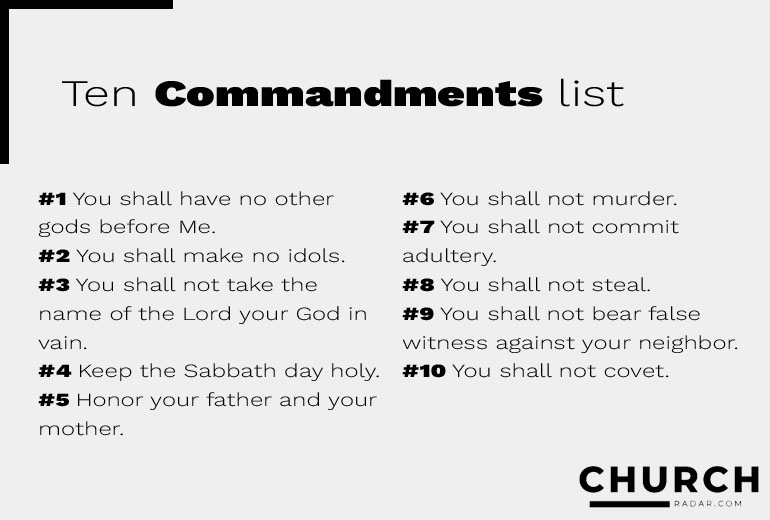Ten Commandments List
- 2023-11-09 by
- ChurchRadar

- Introduction: The Sacred Covenant
- 10 Commandments list
- Ten Commandments meaning
- Why Should You Care About the 10 Commandments?
- Conclusion: Embracing Divine Guidance
In the annals of religious history, few texts carry as much weight and significance as the Ten Commandments. Handed down from Mount Sinai to Moses by God Himself, these commandments form the moral and ethical foundation of Judeo-Christian traditions. In this exploration, we delve into the divine wisdom encapsulated in each commandment, understanding their origin, and unraveling their timeless relevance in our lives.
Introduction: The Sacred Covenant
The Ten Commandments, also known as the Decalogue, are a set of moral and ethical principles given by God to guide His people. They represent a sacred covenant between God and humanity, laying out the framework for righteous living and a harmonious society. Let us embark on a journey through these commandments, seeking not only to understand their origins but to embrace the profound wisdom they offer.
10 Commandments list
- You shall have no other gods before Me.
- You shall make no idols.
- You shall not take the name of the Lord your God in vain.
- Keep the Sabbath day holy.
- Honor your father and your mother.
- You shall not murder.
- You shall not commit adultery.
- You shall not steal.
- You shall not bear false witness against your neighbor.
- You shall not covet.
Ten Commandments meaning
Commandment 1: "I Am the Lord Your God, You Shall Have No Other Gods Before Me"
At the heart of the Decalogue is a foundational call to monotheism. This commandment urges believers to recognize the sovereignty of God, acknowledging Him as the ultimate authority and source of all existence.
Commandment 2: "You Shall Not Make for Yourself a Graven Image"
Building upon the first commandment, the second warns against idolatry. By refraining from crafting images to represent the divine, believers are reminded of the intangible and incomprehensible nature of God.
Commandment 3: "You Shall Not Take the Name of the Lord Your God in Vain"
The third commandment emphasizes the sacredness of God's name. It calls for reverence and respect, discouraging the casual or disrespectful use of the divine name.
Commandment 4: "Remember the Sabbath Day, to Keep It Holy"
In instituting the Sabbath, the fourth commandment establishes a day of rest and reflection. This commandment not only honors God's creation but also prioritizes spiritual renewal and connection with the divine.
Commandment 5: "Honor Your Father and Mother"
Rooted in the family structure, the fifth commandment underscores the importance of honoring and respecting parents. It reflects the divine order and the role of family as a fundamental building block of society.
Commandment 6: "You Shall Not Murder"
The sanctity of life is at the core of the sixth commandment. It unequivocally condemns the taking of innocent life, emphasizing the inherent value and dignity of every human being.
Commandment 7: "You Shall Not Commit Adultery"
Grounded in the sacred covenant of marriage, the seventh commandment prohibits adultery. It upholds the sanctity of the marital bond and underscores fidelity and commitment.
Commandment 8: "You Shall Not Steal"
The eighth commandment addresses issues of property and ownership. It calls for respect of others' possessions and highlights the importance of honesty and integrity in all dealings.
Commandment 9: "You Shall Not Bear False Witness Against Your Neighbor"
The ninth commandment condemns false testimony and deceit. It promotes truthfulness, integrity, and the preservation of justice within the community.
Commandment 10: "You Shall Not Covet Anything that Belongs to Your Neighbor"
The tenth commandment delves into the human heart, cautioning against envy and covetousness. It emphasizes contentment, gratitude, and a focus on spiritual values over material desires.
Why Should You Care About the 10 Commandments?
The Ten Commandments are not mere archaic rules; they form the bedrock of a moral compass that transcends time and culture. Caring about the Ten Commandments is an acknowledgment of the profound impact they can have on our lives.
These divine principles provide a guide for ethical living, fostering a harmonious society and promoting virtues that stand the test of time. By embracing the wisdom encapsulated in the commandments, individuals are invited to cultivate a deeper connection with their spiritual selves, fostering a sense of purpose, integrity, and compassion. The commandments offer not just rules to follow but a pathway to a more meaningful and fulfilling existence, serving as a timeless blueprint for navigating the complexities of the human experience.
Conclusion: Embracing Divine Guidance
As we journey through the sacred Ten Commandments, we encounter not only a set of moral imperatives but a profound roadmap for living a life in alignment with God's will. Rooted in divine wisdom, these commandments transcend time and cultural shifts, offering enduring principles that continue to shape the moral fabric of humanity. May we reflect upon and embrace these timeless truths, allowing the sacred Decalogue to guide our hearts and actions in our pursuit of righteousness and holiness.
Posts You’d Might Like

Who wrote the Book of Hebrews?
- 2023-11-03

Prayer to Saint Michael
- 2023-11-17

What are the seven deadly sins?
- 2023-10-30